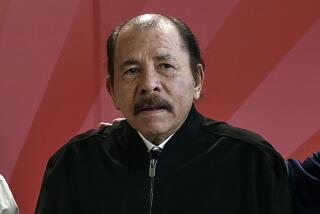U.S. Accuses Nicaragua of Aggression in Region
- Share via
WASHINGTON — The Reagan Administration, countering Nicaraguan charges against the United States in the World Court, accused the Nicaraguan government Friday of longstanding and continuing “acts of aggression” against neighboring Central American countries.
U.S. action against Nicaragua is aimed at persuading “an aggressor government to cease its unlawful acts,” such as arms trafficking and subversion, a newly released State Department report said.
State Department officials said that the report was timed to counter Nicaraguan arguments, now being presented in a hearing before the International Court of Justice, that U.S. support for anti-Sandinista rebels is “state terrorism” and violates international law. The Administration has refused to take part in the hearing at The Hague.
“The Nicaraguans are in the middle of a propaganda blast,” said Elliott Abrams, assistant secretary of state for inter-American affairs. “They are putting out an awful lot of lies. Our view is that with this kind of propaganda barrage coming out, it’s pretty timely to set the record straight.”
New Compilation
Abrams said the new report is a compilation of evidence that the Sandinistas provide military supplies, training and logistical support to leftist revolutionaries in El Salvador, Honduras and Costa Rica. He said that the report contains some new material, although the bulk of it has been made public previously.
“We think it does show that Nicaragua has pursued a policy of subversion--which is to say, aggression--against its neighbors,” Abrams told reporters.
Asked if the report justifies increased U.S. aid to the rebels, known as contras, Abrams said that is not its main purpose, but “logically, it does.”
The Nicaraguan Embassy in Washington dismissed the report as a ploy to “distract attention from the World Court” hearing.
“We firmly and absolutely deny that we are sending any arms to El Salvador,” embassy spokeswoman Miriam Hooker said. A statement by the embassy said the fact that the United States is boycotting the court “is indisputable proof that the United States has no evidence to support the charges it is making against Nicaragua.”
But Abrams said the Sandinista case in the World Court is “so permeated by lies” that it will not stand up to scrutiny.
‘Cease Unlawful Acts’
The new State Department report says U.S. actions are “concerted with allies in an effort to persuade an aggressor government to cease its unlawful acts in the interest of regional peace and security.”
For example, the report says that as of this month, “Sandinista support continues to be an essential element in the training, communications and logistics systems of the Salvadoran guerrillas” who are fighting the U.S.-backed government of San Salvador.
It also says the Sandinistas supported attempts to establish “guerrilla fronts” in Honduras in 1983, 1984 and earlier this year. In Costa Rica, it adds, the Sandinistas “provided covert support and training for the paramilitary wings of far-left groups and supported several terrorist actions.”
New details in the report include intelligence information on an isolated airfield northwest of Managua at Papalonal. In late 1980, the report says, the airstrip was lengthened and hangars or storage buildings were built beside it.
In early 1981, while Salvadoran guerrillas were conducting a major offensive, C-47 cargo planes were seen at Papalonal, the report says.
‘Large Arms Cargoes’
The planes “were used to ferry large cargoes of arms from Papalonal to areas of guerrilla infiltration in southeastern El Salvador,” it says. “Several pilots were identified in Nicaragua who regularly flew the route into El Salvador. Radar tracking also indicated flights from Papalonal to southeastern El Salvador.”
The airlift was directed by the commander of the Nicaraguan air force, Raul Venerio Granera, and a Cuban adviser, the report says.
The United States confronted the Nicaraguan government with evidence of the airlift, Abrams said.
“At first, they said there was nothing going on,” he said. “Later they said they would stop the funny business,” but the Papolonal airlift did not end until December, 1981.
Since then, arms shipments from Nicaragua to Salvadoran guerrillas have continued unevenly, Abrams said, adding, “There has been an ebb and flow” that has been confirmed by the testimony of defectors from the Nicaraguan government and Salvadoran guerrilla groups.
More to Read
Sign up for Essential California
The most important California stories and recommendations in your inbox every morning.
You may occasionally receive promotional content from the Los Angeles Times.













